To Reign in Hell: The Exile of Khan Noonien Singh Read online
Page 2
Kirk raised a tricorder and scanned the horizon. According to the coordinates Chekov had provided, Khan’s former abode should be somewhere in this vicinity, although the ever-changing topography of the windswept desert made it difficult to get one’s bearings. He eyed the tricorder’s display panel attentively, watching for some indication of anything besides sand, rock, and haze.
Chekov and Terrell, he could not help recalling, had been looking for a particle of preanimate matter, only to run into Khan and his genetically engineered acolytes instead. It was a chilling thought.
At first, the instrument yielded no hint as to which way to go, but Kirk had not come this far just to give up. He fiddled with the sensor controls while methodically surveying every centimeter of the surrounding wasteland. His persistence paid off as the tricorder picked up faint readings of artificial alloys somewhere beyond a rocky granite ridge southeast of where Kirk and his companions were now standing. Duritanium mostly, plus composites of cobalt and molybdenum.
“This way,” he said, gesturing toward the ridge. Leading them on, he trudged through the treacherous sand, walking directly into the rampaging wind. The smooth slope of the escarpment made for an arduous climb, and Kirk was breathing hard by the time he reached the top. Sweat soaked through the lightweight garments he wore beneath the environmental suit. Ceti Alpha V was supposed to have Earth-standard gravity, but the heavy ceramic-polymer shell of the suit felt like it weighed a ton. I could use a bit of Khan’s genetically enhanced strength and stamina right about now, he thought enviously.
He paused atop the ridge, taking a moment to catch his breath. Spock and McCoy joined him, the doctor lagging behind his hardier Vulcan colleague. “Well, I’ll be damned,” McCoy muttered as he peered past the hill they had just climbed.
The crest of the ridge looked out over a shallow depression, partially shielded from the storm by steep granite banks, like the eye of a tornado. Less blowing sand meant better visibility, so all three men were able to see, nestled at the base of the hollow, several half-buried large metal structures. The sharp right angles of the rectangular buildings stood in stark contrast to the sinuous curves of the wind-crafted dunes and rock formations.
Just as Chekov described, Kirk thought. Unlike the unlucky Russian, he knew right away what he was looking at: a crude shelter fashioned of recycled cargo carriers, Khan’s dismal abode during his long years of exile on Ceti Alpha V. The ugly, boxlike shacks were a far cry from the sumptuous palaces Khan had enjoyed during his glory days back on Earth.
Anxious to get a closer look, Kirk set out down the leeward side of the ridge. Haste warred with caution as he carefully descended the pebbly concave slope, being careful not to lose his balance. Despite his impatience, he had no desire to tumble down the ridge head over heels.
Behind him, McCoy and Spock made their way down with equal care, but that wasn’t enough to keep McCoy’s feet from sliding out from beneath him as he awkwardly negotiated a particularly treacherous incline in his gravity boots. He toppled backward, waving his arms in a futile attempt to regain his balance.
Fortunately, Spock was there to grab the front of McCoy’s environmental suit, steadying the wobbly physician. “Careful, Doctor,” he admonished McCoy. “As I have often noted, your impetuousness will be your undoing.”
“There was nothing impetuous about it!” the doctor protested, not about to let Spock get the last word. “I just had a little slip, you pointy-eared rapscallion.”
Even with the somber nature of today’s outing, Kirk could not help but smile at his friends’ familiar bickering. It was good to hear Bones banter with Spock again, especially considering that, not so long ago, Kirk had thought they had lost Spock forever.
Thanks to Khan and his insane lust for revenge, Kirk recalled angrily. Khan may not have succeeded in killing me, but, like the bad marksman I accused him of being, he damn well murdered enough people in the process!
Kirk still found it hard to accept that Spock had actually died, albeit temporarily, in this very sector less than a year ago. He winced at the thought of the Vulcan’s agonizing final minutes in the Enterprise’s radiation-flooded engine room. One more death laid at Khan’s doorstep, he reflected, and perhaps, indirectly, at my own.
Reaching the bottom of the slope, he arrived within moments at Khan’s literal doorstep. The pitted exterior of the cargo bays had been stripped of paint by the wind and sand, exposing the dull gray metal underneath. Signs of corrosion mottled the pressed steel walls. Rusted metal blinds covered a single small window, concealing what lay within the makeshift shelter.
Kirk had seen shantytowns on desolate mining asteroids that looked more livable than this.
He waited for Spock and McCoy to catch up with him, then took hold of a closed steel door, roughly fashioned out of an old bulkhead. Decrepit hinges creaked loudly as he tugged open the door, which led to a cramped vestibule that must have served Khan and his followers as a sort of primitive airlock. A second door occupied the far end of the entry. Stuck in its frame, the inner door resisted Kirk’s efforts, and he had to ram it with his shoulder before it finally swung open.
Taking a deep breath, Kirk stepped inside the abandoned lair of Khan Noonien Singh.
The ramshackle interior of the shelter resembled a cross between an army barracks and a junkyard. The sturdy cargo carriers had been laid end to end, like old-fashioned boxcars, creating a chain of rectangular compartments. A phaser had clearly been used to cut doorways in the interior walls, connecting the chambers; the charred edges of the open portals were rough and uneven. Dark red paint still clung to the riveted steel sheets composing the walls, floor, and ceiling. A stamped white notice listing a compartment’s loading capacity betrayed its origins.
In silence, the three men toured the linked compartments. Evidence of habitation, if only of a marginal nature, could be seen all around them: benches, cots, a charcoal stove. Pots and pans hung on the walls, along with coils of recycled cable and wiring. Food and fuel canisters littered the floor, which was only infrequently carpeted with ragged pieces of canvas. A run-down protein resequencer, which looked as though it was being held together by baling wire and tape, rested on a dusty countertop.
Kirk spotted a makeshift chess set, the pieces composed of leftover nuts and bolts. Like most everything else in this improvised habitat, including the very walls, the game had been constructed from cannibalized pieces of scrap. Kirk wasn’t sure whether to admire Khan’s ingenuity or to be appalled at the desperate straits that had obviously driven Khan and his people to make use of every stray fragment of material they possessed.
The men’s heavy bootsteps echoed in the silence of the deserted shelter. Kirk felt as though he were exploring a tomb. No doubt, he thought wryly, Khan would appreciate being compared to an ancient pharaoh.
McCoy finally broke the funereal hush. “According to my tricorder, the air is definitely breathable.” He peered at the lighted display panel on his instrument. “Slight traces of craylon gas, but nothing our lungs can’t handle.”
Kirk took the doctor’s word for it and unfastened the airtight seal of his helmet. Lifting the headgear from his shoulders, he took an experimental breath. To his relief, he did not fall over, gasping.
The air was hot and dry, but just as breathable as McCoy had promised. Although uninhabited since Khan’s escape from Ceti Alpha V a year ago, the shelter still smelled of unwashed human bodies crammed into close quarters for far too long.
I left more than seventy colonists here nineteen years ago, Kirk recalled. How many of them survived in this miserable hovel? Chekov had reported seeing only a couple of dozen followers with Khan, all of them noticeably younger than their hate-crazed leader. The explosive demise of Reliant, however, had made a final body count impossible. Besides McGivers, how many men and women perished in this godforsaken place?
“Shades of Robinson Crusoe,” McCoy murmured, having removed his own helmet. He ran a gloved finger over the casing of a j
ury-rigged air purifier mounted to one wall, leaving a trail in the yellow dust covering the inactive mechanism. He shook his head at the meager living conditions implied by the ill-equipped shelter.
“Perhaps,” Spock agreed, “if Robinson Crusoe was a genetically engineered superman.” He rested his matte-black helmet onto one of the empty cots. “One can only speculate whether ordinary humans could have survived so long under such adverse conditions.”
McGivers didn’t, Kirk thought. The face of the lovely redheaded historian rose from his memory like a restless spirit. He had not known her well, but she had been one of his crew, before he left her behind with Khan and the others. She chose to stay with Khan, he reminded himself, but did I leave her any choice? It was that or a court-martial….
Remembering what Khan had told Chekov about McGivers’ death, Kirk looked about cautiously for the sealed terrarium in which Khan had kept his deadly Ceti eels. To his surprise, the transparent container was nowhere to be seen, although a circular impression atop a dusty tabletop hinted at where the terrarium had once rested.
That’s peculiar, he thought. Had Khan brought his vile “pets” with him when he escaped the planet? If so, the creatures must have died when Reliant exploded.
“Looks like they left in a hurry,” McCoy said, toying with a ceramic cup he found next to a pile of dirty plates and utensils. “They left everything behind.”
Kirk nodded. He had noticed the same thing. “After eighteen Earth-years, I imagine they were sick of looking at them,” he guessed. Plus, Khan was doubtless in a rush to claim his revenge. A shelf of antique books caught his eye, and he scanned the titles on the spines of the volumes. King Lear. Moby-Dick. Paradise Lost.
Kirk was surprised that Khan had abandoned his precious library, but only for a moment. After all those years, his superior brain must have memorized every word.
“Look at this,” McCoy said. He had stumbled across an old Starfleet-issue medkit. Blowing the dust off its lid, he opened the kit, which turned out to be almost completely depleted of first-aid supplies. Only a few skinny rolls of bloodstained gauze remained, along with a broken hypospray and a handful of empty medication cartridges. “Dear Lord,” the doctor whispered.
Kirk remembered how appalled McCoy had been, during their trip to twentieth-century San Francisco, at the barbaric medical technology of the time. He could well imagine the doctor’s dismay at finding even worse conditions in their own era.
McCoy glanced around the forlorn shelter. “Genetically engineered or not, how on earth did Khan and his people survive being cooped up in these broken-down cargo bays for eighteen years?”
“As a matter of fact, that was not what occurred,” Spock said.
“What?” McCoy reacted. He turned toward their Vulcan companion, who surveyed the habitat’s interior with a cool, analytical gaze. “What do you mean by that?”
“Surely, Doctor, you did not believe that these refurbished cargo carriers comprised the entirety of the survivors’ dwellings.” Spock gestured toward the shelter’s sparse decor. “Use your logic. Do you see the resources to sustain a working colony, no matter how rudimentary? Where are the foodstuffs produced?”
Good questions, Kirk thought, even though he suspected he already knew the answers.
“So what’s the story?” McCoy asked. Despite his skeptical tone, Kirk thought he caught a trace of hope in the doctor’s voice, as though he was relieved to hear that the castaways’ lives might not have been as bleak as they first appeared. “Don’t tell me Khan built a Shangri-La just over the next ridge. This entire planet is one big wasteland.”
“Precisely,” Spock agreed. “The surface of Ceti Alpha V is nearly incapable of supporting life, which is why, logically, we must look beneath the surface.”
“That’s right,” Kirk confirmed. “Kyle and the rest of the Reliant survivors reported finding some sort of underground caverns after Khan stranded them on the planet. Unfortunately, they were in no shape to explore them at the time.”
Kirk felt a renewed surge of anger at Khan as he recalled the madman’s brutal treatment of Reliant’s crew. Keeping only the engine-room company, whom he forced into service via the mind-warping Ceti eels, Khan had banished the rest of the crew—some three hundred men and women—to the planet’s surface, but not before venting eighteen years of pent-up fury on the innocent Starfleet personel. Throats had been cut, and bones broken, in a vicious prelude to the massacre at Regula I. At least ten victims had not survived their injuries, and the rest had been too hungry and hurting to do much more than survive.
Khan’s idea of poetic justice, no doubt, Kirk thought resentfully. Never mind that not one of those people was responsible for his exile here!
“I don’t remember anything about caverns,” McCoy protested. He hesitated, a look of uncertainty upon his face. “At least I don’t think I do.”
“You weren’t exactly yourself after Spock’s death,” Kirk reminded him gently. “You had other things on your mind.”
Spock’s katra, among other things.
“In my mind, you mean,” McCoy retorted, giving the Vulcan a dirty look. “But I guess I can be forgiven for blanking on a debriefing or two.” He glanced down at the scuffed duritanium floor of the shelter. “Caves, you say?”
Kirk nodded. “Kyle mentioned something about an access panel in the floor. Let’s look for that.”
“Of course, Captain,” Spock said.
Borrowing Kirk’s tricorder, the science officer scanned the floor. Kirk watched intently, holding his breath. Where the devil is that panel?
An electronic beep announced that the tricorder had found something. His gaze fixed on the sensor display, Spock crossed the compartment until he came to a stretch of floor covered by a torn canvas tarp. He kneeled and yanked the tarp aside with his free hand, exposing a hinged metal grille embedded in the floor. Rising, he nodded at the grille knowingly. “As I surmised, the fresher air is rising from somewhere below, from an underground cavern, either natural or otherwise.”
Kirk opened the grille. A dusty steel ladder led down into a murky, unlit shaft. What are you hiding down there, Khan? he asked silently, but the vengeful tyrant was beyond answering. What answers are buried beneath these huts?
The captain made an instant decision. “Let’s go,” he declared, donning his helmet once more. He activated the suit’s built-in searchlight and stepped onto the top rung of the ladder. “I want to see what’s down there.”
“Are you sure that’s wise, Jim?” McCoy asked. Nevertheless, he dutifully reached for his own helmet.
Kirk paused upon the ladder. “Mr. Spock, do you detect any structural instability below?”
“Not in the immediate vicinity, Captain.” He aimed the tricorder directly at the yawning shaft. “The dense mineral contains trace amounts of kelbonite, making it difficult to scan beyond, say, one hundred thirty-two point six meters.”
Kirk smiled at his friend’s unerring precision. “We’ll take our chances then.” He gave both men a serious look. “Our suits should protect us from any lurking eels, but keep a watch out anyway.” He tapped the type-2 phaser affixed to the belt of his environmental suit. “If you see one, shoot to kill.”
“No kidding,” McCoy muttered. The doctor had seen firsthand the injuries an immature eel had inflicted on Chekov’s cerebral cortex. Thank goodness the damage wasn’t permanent, Kirk thought.
He activated his helmet’s searchlight and resumed his descent down the ladder. The metal rungs were scratched from constant use and wobbled unnervingly. Kirk breathed a sigh of relief when he reached the bottom of the shaft, roughly fifty meters below the compartment above.
Turning away from the ladder, which rattled beneath the weight of first Spock, then McCoy, Kirk swept the darkness with the beam of his searchlight. He found himself in a lifeless cavern, which appeared to be the nexus of several subterranean tunnels that radiated out from the central shaft like the spokes of a wheel.
The
walls of the tunnels were rough and uneven, as was the stony floor beneath his feet. Jagged stalactites hung from the ceiling, even though the dripping moisture that had formed them appeared to have dried out long ago. The massive excavation reminded him of the underground mining complex on Janus VI; Kirk half-expected to see a Horta come burrowing through the walls at any minute.
Reaching the floor of the cavern, Spock and McCoy added their own searchlights to his. The added illumination exposed curtains of solid calcite adorning the walls.
“Good Lord,” McCoy murmured, taking in the gloomy ambience of the sepulchral vault. Kirk wondered if McCoy was also remembering Janus VI, or perhaps the menacing corridors of Roger Korby’s underground sanctuary on Exo III.
“Fascinating,” Spock remarked. He aimed the tricorder down one of the narrow tunnels. “I’m detecting a rather extensive network of underground chambers, linked by branching corridors.” An opened vent in his helmet allowed him to sniff the air, which smelled only slightly better than the sour atmosphere in the cargo bays. “The fresher air is being generated in some of the chambers ahead. Possibly gardens of some variety?”
Kirk was impressed. “How large is this network?”
“Impossible to say, Captain,” Spock replied. “As I mentioned, the presence of kelbonite makes long-range scanning difficult. There may even be additional levels deeper below us.”
Kirk ran the palm of his glove over a section of wall that showed evidence of being chiseled by hand. “Did Khan and his people carve out this entire installation?” Even with eighteen years of superhuman labor, it seemed an enormous task to complete.
Spock shook his head. “More likely, they adapted an existing network of caverns for their own use. Portions of these catacombs appear to have been formed by natural geological processes, while other regions have been expanded and excavated by artificial effort.”
“Perhaps they were driven underground,” McCoy speculated, “by the cataclysm that devastated the surface?”
“A highly probable supposition, Doctor,” Spock said.

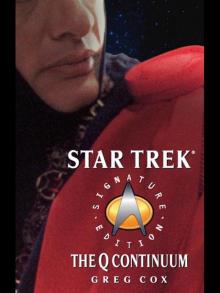 Q-Space
Q-Space Godzilla - the Official Movie Novelization
Godzilla - the Official Movie Novelization War for the Planet of the Apes: Official Movie Novelization
War for the Planet of the Apes: Official Movie Novelization Underworld: Evolution
Underworld: Evolution Underworld
Underworld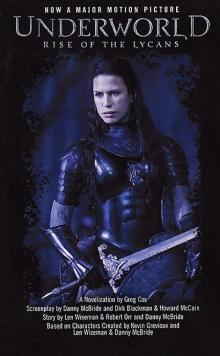 Rise of the Lycans
Rise of the Lycans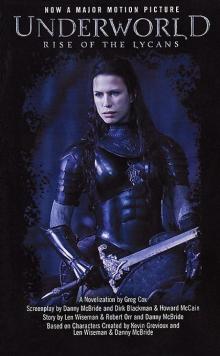 04 - Rise of the Lycans
04 - Rise of the Lycans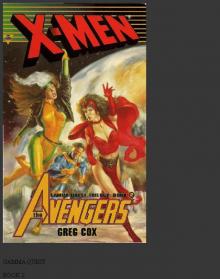 X-Men and the Avengers: Search and Rescue
X-Men and the Avengers: Search and Rescue Child of Two Worlds
Child of Two Worlds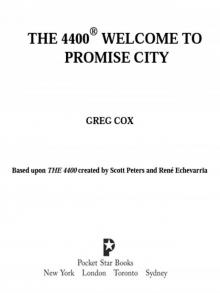 Welcome to Promise City
Welcome to Promise City The Librarians and the Mother Goose Chase
The Librarians and the Mother Goose Chase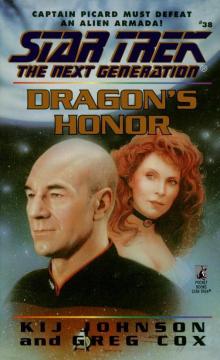 Dragon's Honor
Dragon's Honor 03 - Evolution
03 - Evolution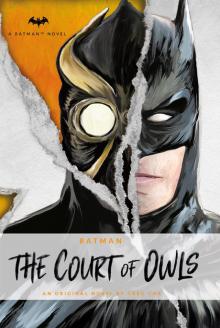 DC Comics novels--Batman
DC Comics novels--Batman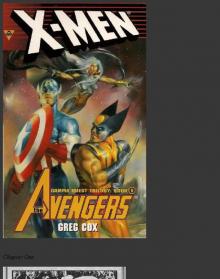 X-Men and the Avengers: Lost and Found
X-Men and the Avengers: Lost and Found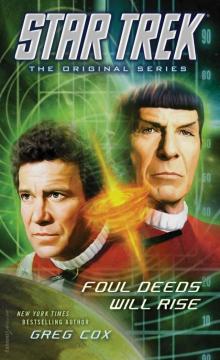 Foul Deeds Will Rise
Foul Deeds Will Rise 02 - Blood Enemy
02 - Blood Enemy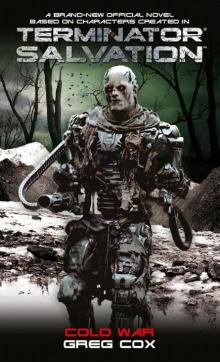 Terminator Salvation: Cold War
Terminator Salvation: Cold War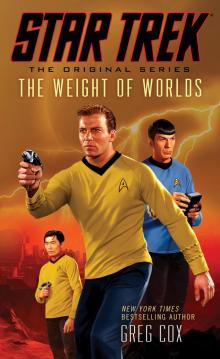 The Weight of Worlds
The Weight of Worlds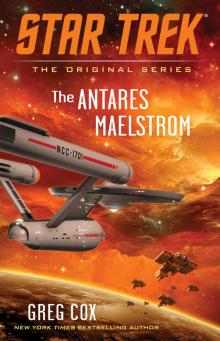 The Antares Maelstrom
The Antares Maelstrom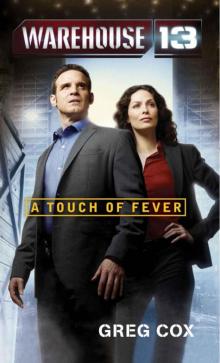 Warehouse 13: A Touch of Fever
Warehouse 13: A Touch of Fever Underworld: Blood Enemy
Underworld: Blood Enemy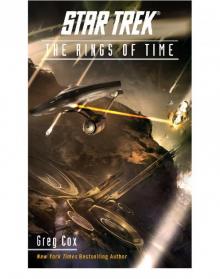 The Rise and Fall of Khan Noonien Singh
The Rise and Fall of Khan Noonien Singh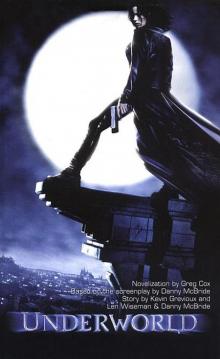 01 - Underworld
01 - Underworld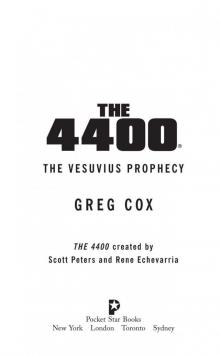 The 4400- the Vesuvius Prophecy
The 4400- the Vesuvius Prophecy Assignment: Eternity
Assignment: Eternity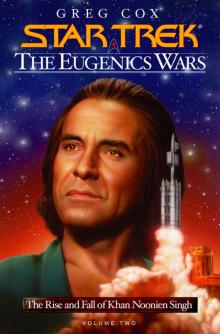 The Eugenics Wars, Vol. 2: The Rise and Fall of Khan Noonien Singh
The Eugenics Wars, Vol. 2: The Rise and Fall of Khan Noonien Singh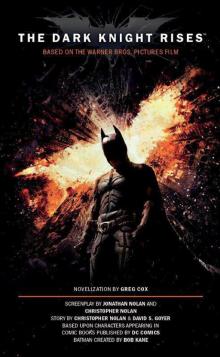 The Dark Knight Rises: The Official Novelization
The Dark Knight Rises: The Official Novelization The Bestseller Job
The Bestseller Job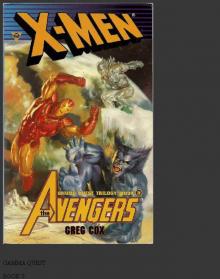 X-Men and the Avengers: Friend or Foe?
X-Men and the Avengers: Friend or Foe?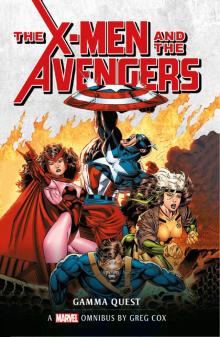 Marvel Classic Novels--X-Men and the Avengers
Marvel Classic Novels--X-Men and the Avengers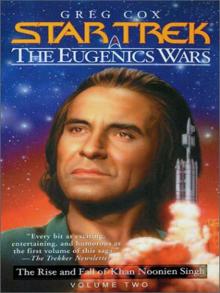 STAR TREK: TOS - The Eugenics Wars, Volume Two
STAR TREK: TOS - The Eugenics Wars, Volume Two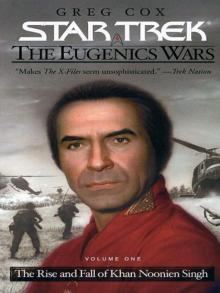 STAR TREK: TOS - The Eugenics Wars, Volume One
STAR TREK: TOS - The Eugenics Wars, Volume One The Black Shore
The Black Shore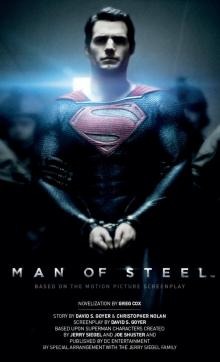 Man of Steel: The Official Movie Novelization
Man of Steel: The Official Movie Novelization Loose ends r-1
Loose ends r-1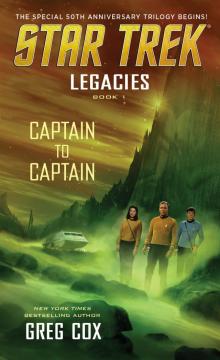 Legacies
Legacies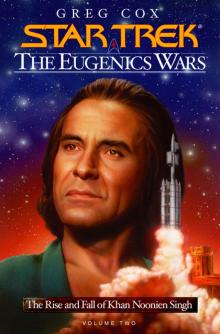 The Eugenics Wars, Volume Two
The Eugenics Wars, Volume Two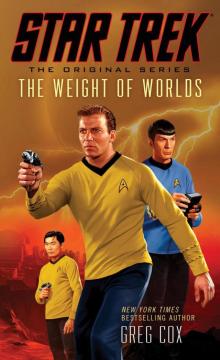 Star Trek: The Original Series - 148 - The Weight of Worlds
Star Trek: The Original Series - 148 - The Weight of Worlds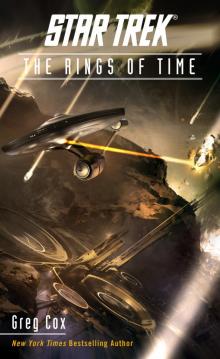 Star Trek: The Original Series: The Rings of Time
Star Trek: The Original Series: The Rings of Time Godzilla--The Official Movie Novelization
Godzilla--The Official Movie Novelization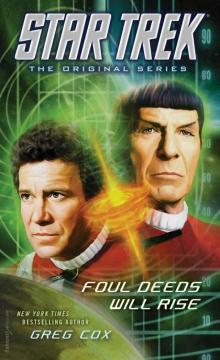 Star Trek: The Original Series - 160 - Foul Deeds Will Rise
Star Trek: The Original Series - 160 - Foul Deeds Will Rise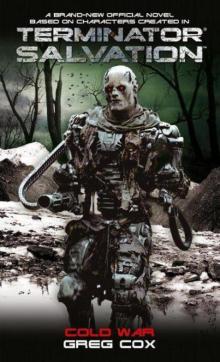 Terminator Salvation: Cold War ts-3
Terminator Salvation: Cold War ts-3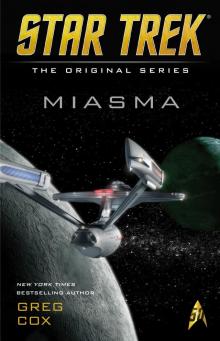 Star Trek: The Original Series: Miasma
Star Trek: The Original Series: Miasma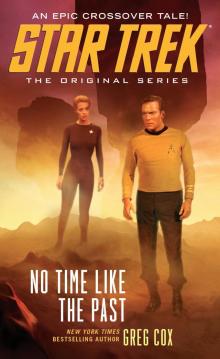 Star Trek: The Original Series: No Time Like the Past
Star Trek: The Original Series: No Time Like the Past Child of Two Worlds (Star Trek: The Original Series)
Child of Two Worlds (Star Trek: The Original Series)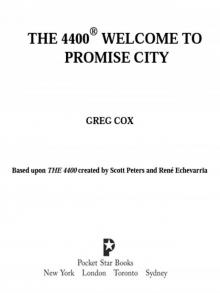 THE 4400® WELCOME TO PROMISE CITY
THE 4400® WELCOME TO PROMISE CITY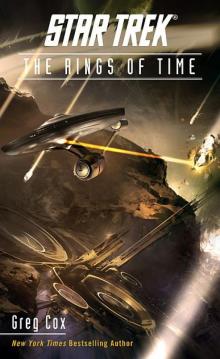 Star Trek: The Original Series: The Rings of Time (star trek: the original series)
Star Trek: The Original Series: The Rings of Time (star trek: the original series) To Reign in Hell: The Exile of Khan Noonien Singh
To Reign in Hell: The Exile of Khan Noonien Singh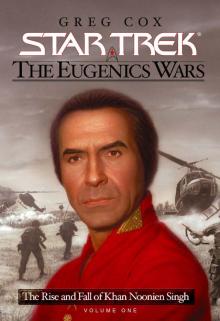 Star Trek: The Eugenics War, Vol. 1
Star Trek: The Eugenics War, Vol. 1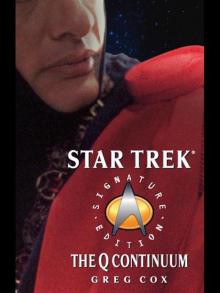 The Q Continuum
The Q Continuum